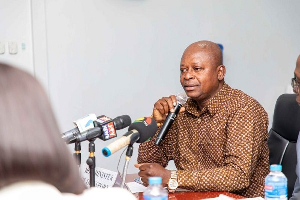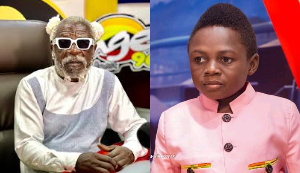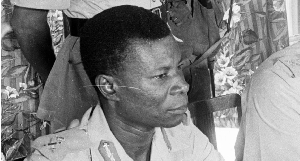ABOUT TWO weeks ago, the Director-General of the Ghana Broadcasting Corporation (GBC) was sent home with the TERMINATION of his appointment. The act was carried out by the National media commission (NMC), the body mandated by the 1992 Constitution, to ensure security of tenure in state media institutions. Mr. Seth Ago Adjetey was immediately replaced with Miss Eva Lokko, a broacaster engineer who had previously been employed by the corporation she now heads. She appears well qualified for her new post.
When questions were raised as to why Adjetey was relieved of his post both the Executive Secretary, Mr. Yaw Boadu-Ayeboafoh, a journalist, and the Chairman, Mr. Nutifafa Kuenyehia, a lawyer, have been on air to say that because the former GBC boss was not dismissed by merely had his appointment TERMINATED, the NMC owed no one an explanation.
Well, the National Concord begs to differ with both gentlemen and the entire NMC membership whose apparent collective position they have espoused. We insist that any time the NMC has caused to sack an employee of the state media, either through termination or dismissal, it should always come with copious explanations, if the Commission?s credibility is to remain INTACT. The National Concord acknowledges that it is accepted corporate practice worldwide not to give reason for termination of appointments.
But we do not accept that the NMC given its special antecedents, should adopt that procedure as ?normal? practice; first, it is not a commercial enterprise whose shares might lose value suddenly if the misdeeds of one of its executives made public. Secondly, and more importantly, an act of impunity as a terminations of appointment undermine the very reasons why the NMC was set up by the sovereign people of Ghana.
Time was, not in the too distant past, when chief executives and other high officials of the state media sat on tenterhooks or on the edges of their very comfortable seats, especially as the clock inched its way towards one o?clock, fearful that the News at One, would send them into the unemployment market. Ghanaians found that such uncertainty of tenure made such men and women pliable to dictate from politicians who often wanted to protect their short term parochial interest and not those of the nation.
In their collective wisdom, Ghanaians thought the best way to save such officials from premature heart attacks and the nation from their inimical acts was to take the power to hire and fire these officials away from politicians to disinterested public-spirited individuals who do not depend on government for their livelihood. It is this group of individuals that the framers of the 1992 Constitution in their wisdom called the National media Commission. Now with the NMC firing and arrogantly refusing to offer reasons on the basis of technicality, we seem to have regrettably come full circle. The National concord says No! and No!! and No!!!
We would request the Executive Secretary, Boadu-Ayeboafoh to, for moment, put himself in the shoes of those colleagues he left at the Daily Graphic for his present post. How would he feel if he were still at the Graphic and the NMC was making itself unaccountable as is the case now? How does he think the Apentengs, the Aryehs, the Dadsons at Graphic and Ghanaian Times are feeling? Most likely quaking in their shoes and wondering when an NMC letterhead would ask them to see the Accountant for their entitlement and go and sit at home. This state of anxiety and uncertainty was supposed to have evaporated with the coming into force of the 1992 Cosntitution. Ten solid years later, however, the NMC seems unconcerned that its refusal to proffer reasons for the removal of a top media executive was re-imposing a culture of fear, among state media practitioners . there was a former Executive Secretary who opposed the Chairman and other members all the way, on one occasion locking them out of their offices. That was condemanable, not because he opposed them, but because he did so to please those who appointed him in an attempt to thwart the good work of the commission. A NMC executive secretary should feel free to oppose the other members in the national interest, as in the case of the termination of the GBC boss without explanation and the National Concord expects our colleague executive secretary not to compromise in situation where the interest of the profession would be better served, that way.
The National concord wishes to repeat, for the avoidance of doubt, that it is in the interest of the National Media Commission to give reasons whenever it finds it necessary to terminate appointments. For all we know, the firing of the ex-GBC boss was carried out in the interest of the profession but not to please any politician, but, unfortunately we do not know, and those who know refuse to say, so we cannot applaud them.
We all may recall that recently the Wuaku Commission complained publicly that a report from one of its sittings carried on both GBC radio and TV was a far cry from what took place that day. The GBC correspondent in Sunyani, when called to order, said the offending words and phrases were not in the report she sent to Accra. It was reported last week that a GBC official in Accra had disclosed that the report was altered on the instruction of a high government official in the capital.
If this report is true, it could be that the ex-GBC boss either condoned the illegality or refused to be part of it. If he connived at it, then he deserves the termination and the NMC kudos for acting promptly to preserve the integrity of the GBC. If, however, he opposed it then he needs commendation and not termination and the entire membership of the NMC ought to resign immediately for succumbing to government pressure and not preserving its independence.
Which of these two scenarios is true, NMC? What are we to believe, National Media Commission; that you are on top of your constitutionally assigned duty to insulate the state media from government control and meddling, or that you have compromised your self and no longer deserve our respect?
The National Concord desperately wants to believe the former propostion, but we cannot blindly do so in a culture of silence. We do not believe that a wish to save a former employee?s face is more important than preserving the integrity of the NMC. We do hope that this would be our last word on this issue.












